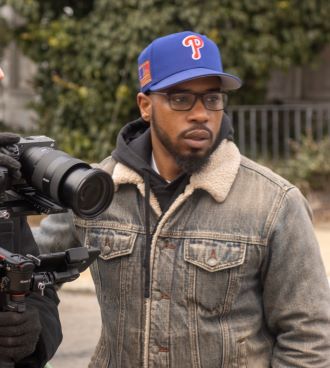Shuja Moore became a filmmaker to flip the script on the kinds of stories he heard and watched growing up. In his childhood, movies like Scarface and rap music that “just celebrates criminality” were what impressed him and his friends.
“Instead of taking it as art, we took it as directions,” he recalls. “That’s how you boss up.”
Moore followed the “directions” closely himself, which landed him in prison in his early 20s. While he served his sentence, he saw firsthand so many other young people who followed media representations of lawlessness. What he saw inspired him — in a surprising way.
“I was like, Can I use the same medium to try to positively influence people?” he says. “So that was kind of my starting point with film.”
After serving over a decade in prison, Moore, now 41, was released in 2016. On Tuesday, he hosts a screening in West Philadelphia of his latest film, Pardon Me, a look at three returned citizens who have become upstanding citizens and are seeking pardons so they can clear their records, start fresh and bring their potential to their communities.
Horrible everyday decisions
In 2004, when Moore was 22, he was “in the streets making horrible decisions, trying to be a drug dealer as a shortcut to entrepreneurship.” That led to him carrying guns, abusing weed and alcohol. He had a gun on him when he got into a fight at a nightclub in Northern Liberties. The person he was fighting grabbed the gun and, when a bouncer jumped in to break up the scuffle, all three men wrestled for the firearm. In the scuffle, a shot went off. The bullet went through the bouncer’s side and pierced the abdomen of a bystander.
Though the bouncer survived, the bystander — 24-year-old Joey Motto — did not. He died the next day in the hospital. Moore, who calls that night “the worst decision I’ve ever made,” was charged with third-degree murder and sentenced to 12 to 24 years in prison. He later publicly apologized to Motto’s family.
“Prison really opened my eyes to what causes crime, and the struggle a lot of young Black men face trying to be successful and find value and power in this society,” Moore, a West Philadelphia native, says. When Moore was released from prison in 2014, that struggle only continued.

Moore gets to the root of that struggle, as well as how it might be solved, in Pardon Me, which was released in 2023. Moore directed and produced the film, and also makes a short cameo at its conclusion. The film, which will screen at the West Philadelphia Skills Initiative in partnership with Economy League of Greater Philadelphia, illustrates how people with criminal records — often relegated to “second class citizen status” — can get a second chance by way of pardon.
The screening will be followed by a conversation with Moore and experts in the pardon space, and a discussion about Philadelphia-area challenges and opportunities.
Individuals within the criminal justice system can find themselves permanently bound to and defined by their criminal records. “When a judge sentences someone to 5 to10 years behind bars, the judge doesn’t also describe all of the civil disabilities that person will experience as a result of that sentence,” explains Dr. Caitlyn Taylor, LaSalle University Associate Professor of Criminal Justice, in the film.
“Demonstrating who I am”
People with a criminal record — especially those convicted of a violent crime — can be barred from jobs, mortgages, small business loans, college financial aid, military service and more. Moore himself says he has been permanently banned from Airbnb; from getting jobs at Uber and Target; and from the dating app Hinge due to his sentence. “[There are] so many different areas of our society that we wouldn’t think about, that a criminal record will stop you,” Moore says. “It’s a reminder that You are not part of us.”
One of the main ways criminal records harm both individuals and communities is loss of earning potential. In Philadelphia, more than 90 percent of individuals in state prison are being released back into poor communities. “There’s a reason that these communities stay entrenched in this poverty,” explains Taylor Pachecho, Deputy Executive Director of Philadelphia Lawyers for Social Equity (PLSE). “It’s because most of the adults in those communities are disenfranchised from participating in our economy in a meaningful way.”
In 2020, PLSE commissioned Economy League of Greater Philadelphia to conduct a study that would quantify the loss of economic potential for individuals who hold criminal records in PA. Looking at a 10-year slice of data, the report “examines the impact of pardons, and quantifies their economic impact in low-income, high-arrest communities in Pennsylvania.”
“We’re not talking about letting people who are active in crime get away. We’re not talking about opening up all the prisons and releasing everybody. We’re talking about people who are already in our communities operating, but are struggling. Let’s remove that [barrier] and let them be full citizens, [so they don’t] have to struggle anymore.” — Shuja Moore
The impacts are not small. Nearly 1 in 3 Americans have a criminal conviction of some sort which, on a local level, equates to roughly 400,000 Philadelphians and 3 million Pennsylvanians. The report notes that collectively, Philadelphia residents with criminal records are losing $1.6 billion in wages annually, and PA residents are losing $12 billion.
Pardons represent one of several measures that can alleviate the impact of a criminal record. In PA, pardon recipients earned an additional $16 million in wages — or about $4,000 more per person, annually. These wage increases, in turn, can have an incredible impact on the community. “In Philadelphia, we tax 4 percent of people’s earnings; it’s our biggest revenue source,” explains Jeff Hornstein, Executive Director of the Economy League. “We have an underfunded Streets Department … Our schools need funding. Anything that can generate more tax revenue, that does not hurt our competitive position, we should be pursuing.”
Pardon Me follows three people who have criminal records, have dedicated themselves to being upstanding citizens since their release, and are now applying for pardons. As the Economy League report shows, the positive track records the individuals in the film exhibit is not unique among those who apply for pardons in PA. Where, nationally, the recidivism rate is 60 to 70 percent, the rate of re-offending is less than 2 percent among Pennsylvanians who have applied for pardons.
“We’re not talking about letting people who are active in crime get away. We’re not talking about opening up all the prisons and releasing everybody,” Moore says. “We’re talking about people who are already in our communities operating, but are struggling. Let’s remove that [barrier] and let them be full citizens, [so they don’t] have to struggle anymore.”
Where pardons offer a second chance to individuals with criminal records, Pardon Me is Shuja Moore’s own second chance at telling his story. Though he was released in 2016, Moore will be on parole until 2028. Then, 10 years of probation will begin. This means that Moore will continue to remain in the criminal justice system until he is 56 years old: 34 years after his initial crime. Still, even when he has completed his probation, his criminal record will remain. Moore hopes that, in time, he will join the people he profiled in his film by receiving his own pardon.
“I think at this point I’m demonstrating who I am and what I’m about, and the record just continues to serve as a barrier for me being able to fully live out what I’m trying to do,” he says.
Pardon Me is screening January 23 at 5:30pm at the West Philadelphia Skills Initiative, 22 S. 40th Street, 3rd Floor (tickets: $25 – $75), and February 27 from 3 to 5pm at Temple University Charles Library. Temple’s event includes a panel discussion with Shuja Moore, a recent PA pardon recipient, Nyron N. Crawford, Associate Professor of Political Science at Temple, and Tobey Oxholm, Director of The Pardon Project. Register for that event here.
![]() MORE JUSTICE REFORM FROM THE CITIZEN
MORE JUSTICE REFORM FROM THE CITIZEN



